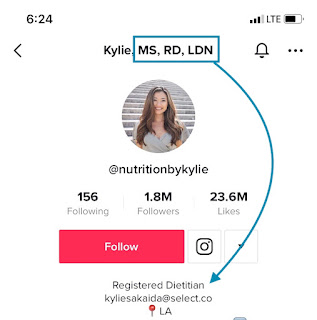Who do you let influence you?
Have you ever found yourself mindlessly scrolling for hours on your favorite social media site? Whether its Facebook, Instagram, Pinterest, TikTok, Snapchat, YouTube or any other one of the many out there, it’s pretty rare to find someone that doesn’t have at least one form of social media now-a-days. But social media has strayed far from its original purpose. Originally social networking platforms were created to allow people to stay connected with their friends and families, however, now-a-days the rise of the “influencer” has shifted people’s friends lists to include more strangers than people they’ve actually met in real life. But what exactly is an influencer and why do we base our trust on the amount of people that follow them?
One of the hottest topics across most social media platforms is nutrition. What should I be eating to lose weight? Will this juice cleanse help me lose 20 pounds in two weeks? How many calories should I consume a day? Is keto a good way to lose weight? Is butter a carb? As a dietetics student and a young adult on many different social media platforms, I am lucky enough to be able to pick out when social media influencers are providing incorrect nutrition advice. Today I am here to provide you with a few tips to identify when you should keep scrolling if someone other than a true nutrition expert is answering any of the questions above!
Are they a registered dietitian?
Registered dietitians are considered nutrition experts through earning either a bachelors or master’s in nutrition and completing at least 1,200 hours of supervised practice. You can identify a dietitian by the credentials after their names, such as “RD” or “RDN”. These credentials prove the individual is giving evidence-based education and has put in the work necessary to earn the title of “Nutrition Expert”. If someone is providing nutrition education, check their bio for their credentials and if you don’t see them, keep scrolling!
Do they call themselves a nutritionist?
Did you know there is no regulations in the US regarding the term nutritionist? I could read a cereal box food label and call myself a nutritionist! Unless a person has a degree in nutrition, I would recommend taking their advice with a grain of salt. So, if your favorite influencer calls themselves a nutritionist, but has no higher education in the field, I recommend unfollowing them. While people can be passionate about nutrition and have found a lifestyle regarding food that works for them, that doesn’t mean what they do will work for you. Nutrition education should be as personalized and unique as you, so if someone is basing their advice on their past experiences, strict rules, or claims not backed by research, odds are it’s not going to have the same results for you.
So now what?
Social media can be a great way to stay in touch, be entertained, and even learn new information. Just remember to follow these tips to ensure you are getting safe and reliable information.
-PR
Resources:
https://whatsgood.vitaminshoppe.com/social-media-influencer-red-flags/


Comments
Post a Comment